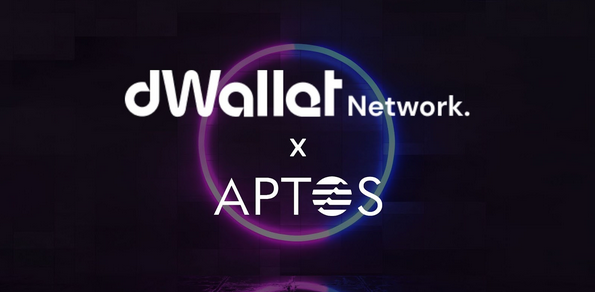dWallet Network, a pioneer in native multi-chain technology, is excited to expand its platform to Aptos, a leading and high-speed Layer-1 blockchain. This integration aims to bring Zero Trust Protocols (ZTPs) with native multi-chain interoperability to the DeFi and gaming ecosystems on Aptos. With dWallet’s Zero Trust architecture, ZTPs built on Aptos will seamlessly sign transactions on Bitcoin, Ethereum, and other blockchains without the need for bridging or wrapping, unlocking new multi-chain experiences.
Aptos is renowned for its secure, high-throughput, and low-latency blockchain capabilities, utilizing the Move smart contract language to offer developers a robust and secure platform for building sophisticated applications while maintaining extremely low and consistent gas fees. With dWallet Network, Aptos developers will be able to create ZTPs with native, noncollusive, and decentralized dWallets, enabling seamless multi-chain interactions across Web3.
This expansion is particularly significant for DeFi initiatives on Aptos, offering the unprecedented ability to include native BTC and ETH transactions, marking a milestone in blockchain interoperability and functionality. dWallet Network introduces a fundamental building block that enables control over any asset and the enforcement of any logic across any network. dWallets use cryptographic signatures, making a dWallet-generated signature indistinguishable from a regular user’s signature from a network perspective.
This unique capability extends even to non-smart contract networks like Bitcoin, enabling the creation of ZTPs that operate across networks without bridging or wrapping, upholding Web3 principles of decentralization and user ownership. dWallet’s Zero Trust framework represents a significant step towards a truly user-centric, interconnected, and flexible blockchain infrastructure.
Omer Sadika, Co-Founder of dWallet Network, expressed his enthusiasm about the expansion to Aptos:
“We are excited to bring our decentralized, noncollusive dWallet building block to the fast and secure Aptos blockchain to enable ZTPs. This broadens horizons for DeFi and gaming protocols within the Aptos ecosystem and represents a significant leap towards realizing our vision of a seamless, Zero Trust, and multi-chain future.”
To implement the dWallet’s Zero Trust primitive, dWallet Network utilizes 2PC-MPC, a state-of-the-art threshold protocol developed by its team. This industry-first MPC protocol enables the generation of an ECDSA signature in a noncollusive way, requiring participation from both the end-user and a large number of validators, potentially reaching hundreds or even thousands.
Professor Benny Pinkas, Researcher at Aptos, commented on the dWallet integration:
“The dWallet team led pioneering cryptography research to introduce the innovative 2PC-MPC protocol, enabling multi-chain Zero Trust. I’m excited about developers in the Aptos ecosystem being able to develop ZTPs that operate seamlessly across all of Web3 in a cryptographically secure way.”
Bringing the dWallet Network to Aptos marks a significant milestone, promising unprecedented flexibility, security, and interoperability to multichain DeFi and gaming. As this integration unfolds, it is set to catalyze innovation and accelerate adoption, opening new avenues for developers and providing users with richer, more diverse blockchain experiences.
For press enquiries, please contact:
Siva Sagiraju, Marketing Lead
Siva@dwalletlabs.com
About dWallet Network:
dWallet Network enables Zero Trust Protocols (ZTPs) that maintain native Zero Trust security while operating across different networks. ZTPs powered by dWallet Network can swap, borrow against, or stake native BTC (or any other native asset), bringing programmable native BTC to L1s/L2s without bridging or wrapping.
About Aptos Network:
Aptos is a next-generation Layer 1 blockchain. Aptos’ breakthrough technology and programming language, Move, are designed to evolve, improve performance, and strengthen user safeguards. Please visit Aptos Foundation for more information on the Aptos blockchain.
Credit: Source link












































































































































